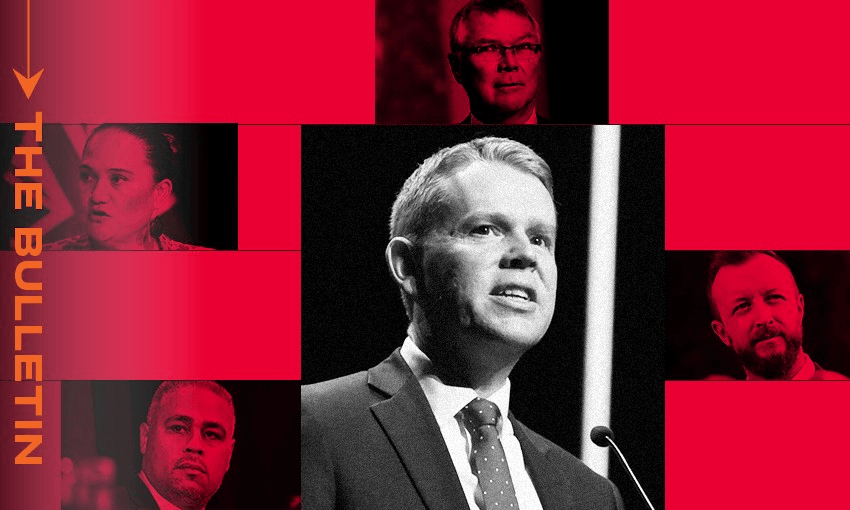The battle for the next election starts now, writes Stewart Sowman-Lund for The Bulletin.
To receive The Bulletin in full each weekday, sign up here.
We’re still about two years out from the next election, but the Labour Party has kicked its plan to boot National out after a single term into gear. The party held its annual conference in Christchurch over the weekend, laying out some key priorities and promises should it make it into government come 2026. As the Herald’s Thomas Coughlan reported, leader Chris Hipkins promised to build the new Dunedin hospital at the level it had been promised prior to the 2023 election, before the coalition scaled back the project and prompted major protests in the South Island. While the coalition has copped a lot of fire over its decision to commit to a smaller rebuild, some will remember that Labour promised back in 2017 under Jacinda Ardern to start work on a new hospital in its first term.
It was also announced yesterday that a Hipkins government would reintroduce the Smokefree Aoteaora policy and invest in a publicly owned interisland ferry service with some rail capability, while MP Kieran McAnulty was confirmed to chair the 2026 campaign for Labour. And, perhaps most interestingly, Hipkins said that under a Labour government, New Zealand would not join the Aukus security alliance – and would be withdrawn from it should the coalition get us in there first.
The implications of the Aukus call
For those who are understandably still a bit confused by Aukus, The Spinoff’s Joel MacManus wrote a helpful explainer back in May. In short, it’s a military partnership between Australia, the United Kingdom, and the United States. But since its first pillar focuses on nuclear-powered submarines, and we have a well known anti-nuclear stance, there hasn’t been any need for us to be involved. Pillar two, however, is focused on things like cybersecurity and information sharing, so there’s a valid reason New Zealand might be keen to sign up.
Hipkins’ decision to take a strong stance should he become the next prime minister will present challenges for the current government. As Dan Brunskill at Interest noted, governments tend to seek bipartisan support for foreign and defence policies, meaning the coalition would have to go out alone should it be invited to join Aukus. Nevertheless, progress on this could still be a while off – New Zealand hasn’t actually received an invite to join pillar two of the pact, though early conversations have started. Labour has spent much of its time in opposition criticising the government for cozying up to the United States through its exploration of Aukus, while the government has said it’s only continuing work that was started under Labour. Former political enemies Don Brash and Helen Clark are among the critics that have warned the government about its shift in foreign policy.
And, in an interview with RNZ’s Guyon Espiner last week, China’s ambassador to New Zealand Wang Xiaolong warned that were we to join Aukus, it would have negative consequences for our critical relationship with China. “We hope that when weighing up this all-important decision, New Zealand will take into account its own long-term best interests, the potential implications for regional security, and the impact on the relationship between China and New Zealand,” he said.
Tax debate, but no tax policy
Of course, it wouldn’t be a Labour conference without a tax debate – especially given the party has already made some rather costly promises. Labour has started sowing the seeds for another shot at implementing some form of capital gains or wealth tax, reported Maiki Sherman for 1News. There’s still no policy ready to be put forward publicly, however, though party members backed a proposal to move forward with work on a new tax, meaning it’s likely one will end up front and centre of the election campaign.
If you’re getting a strong sense of déjà vu, you’d be right. Labour has a strong “will they, won’t they” relationship when it comes to campaigning on tax reform – though Hipkins has made it clear he intends to listen to his party this time around and return to “traditional” party values. Writing for The Sunday Star-Times, commentator Vernon Small questioned whether Labour will be able to win a debate it has lost on several previous occasions, noting that deciding whether to run with a capital gains or wealth tax is only part of the debate. For example, there’s the question of whether Labour will choose to revisit the “tax switch” idea – one that would mean using revenue raised from any new taxes to cut taxes elsewhere – or else try to win over wary voters with the possibility of paying more without an instant reward. Politik’s Richard Harman noted (paywalled) the internal division within Labour’s wider membership over what tax policy to pursue, and criticism from some that Hipkins was responsible for dumping the policy in the run up to last year’s election.
Polling boosts Labour’s confidence
Meanwhile, Labour will be feeling buoyed by internal polling that shows the race could already be tightening up. As reported by Stuff’s Bridie Witton, the latest Talbot Mills poll, provided to Labour on a weekly basis, has the party one point ahead of National – 32% to 31%. Hipkins is also a nose ahead of Christopher Luxon as preferred prime minister. Of course, this is just one poll and of just a 700-strong sample – for Labour to really feel confident, it would need to see this same result replicated in a major survey and, so far, these numbers are an outlier (a recent Curia poll had National seven points up on Labour, while an October 1News Verian poll showed an eight point gap).
Two years out from the next election, let the games begin.
